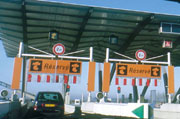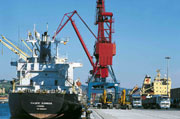News

VP Kallas seeks stronger EU-Turkey cooperation on transport
16/05/2012
The Commission Vice-President responsible for transport, Siim Kallas visited Ankara to enhance transport cooperation between the EU and Turkey. In line with the Commission "positive agenda", Vice-President Kallas discussed the establishment of a roadmap for EU transport relations with Turkey, including regular high-level meetings and the establishment of a structured dialogue with Turkish authorities.

Road charging plans must be fair to all drivers
14/05/2012
The European Commission has today issued guidelines warning that under EU law road charging schemes must not discriminate against foreign drivers. The aim is to assist Member States who are considering introducing new charging schemes for private cars.
Vice-President Siim Kallas said: "Non-discrimination is a fundamental right under EU law. It must be as easy for a French or British citizen to drive across Slovenia or Belgium as it is for a resident driver. Road charging systems must be transparent and fair to all."

Steering a course for the future: Europe's ports in the 21st century
11/05/2012
Importance of ports for economic recovery and jobs
Sea ports play an important role facilitating the European Union's external trade (90% of the total, in terms of weight) and internal market exchanges (40% of the total). They provide a service to many other industrial sectors and are nodal points of inter-modal logistic chains of key importance for the sustainable growth of transport in Europe.
European ports are also important job generators. At EU level, the extent of the employment effects of port activity (direct, indirect, induced and related activities) represents million of jobs ![]() [2 MB] and a significant contribution to economic growth (GDP).
[2 MB] and a significant contribution to economic growth (GDP).
In the perspective of the economic recovery, there is a question of ensuring that economic growth and the creation of jobs are not hampered by constraints in ports and in the links to and from them. Good port services are of key importance for reinforcing the competitiveness of European export companies in world markets.
However, the development of ports and the integration of ports in wider logistic chains remain uneven at European level. Some European ports are important generators of added value and employment at the local, regional, national and even European levels. They serve hinterland areas that go far beyond national boundaries. Some other ports are lagging behind in terms of efficient use of available facilities, reliability in the handling of freight and passenger's services and contribution to sustainable transport effort.
The disparities of performance between different European ports affect the distribution of cargo flows and on the organisation of logistic chains across Europe.
Poor-performing ports represent a missed opportunity – and wasted resources – for the creation of added value and jobs for the concerned regions. Moreover, ports are key nodal points of the Trans-European Transport Networks (TEN-T). Poor-performing ports represent a problem for the smooth functioning of the whole network.

Hearing of the TRAN committee on the TEN-T guidelines
08/05/2012
Speech delivered by Vice-President Siim Kallas at the hearing of the TRAN committee on the TEN-T guidelines


